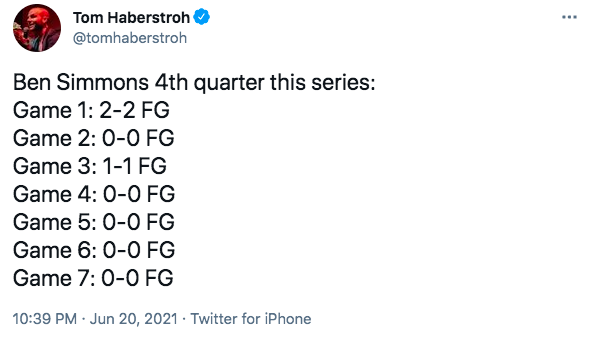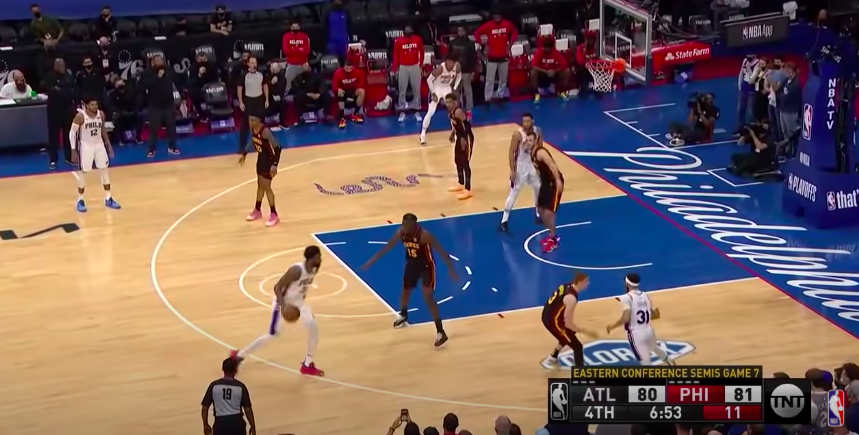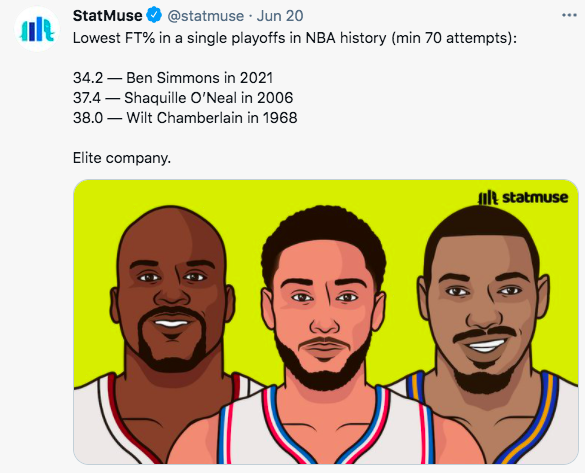Sixers' collapse against Hawks shows they were never built for playoff success
As the Sixers labored their way through Game 7, searching for any way to produce consistent offense against the Atlanta Hawks, a problem that had been mostly overlooked all year became magnified.
Even though they posted the third-best record in the NBA during the regular season, the overarching question with the Sixers entering the playoffs was whether or not their offense was good enough to win a title.
The longer the series went, the clearer it became that the answer to that question was a resounding no. It’s why the Sixers – after claiming the No. 1 seed in the Eastern Conference for the first time in two decades, behind an MVP finalist in Joel Embiid, a Defensive Player of the Year finalist in Ben Simmons, a head coach with championship pedigree in Doc Rivers, and a supporting cast that blended with the franchise’s two homegrown stars better than at any point since they entered the league – are heading home early once again.
The Sixers earned home-court advantage in the playoffs behind with a defense that ranked second in the league in defensive rating during the regular season. First-year President of Basketball Operations, Daryl Morey, did a tremendous job of overhauling the roster with limited resources to make the pieces fit better offensively.
He essentially replaced Josh Richardson and Al Horford Seth Curry and Danny Green to provide more spacing around Embiid and Simmons. That also benefitted Tobias Harris by allowing him to move back to his more natural power forward position. Harris, in turn, had arguably the best season of his career and made the five-year, $180-million max contract he signed two years ago look like much less of an overpay. Signing Dwight Howard also gave Embiid the most competent backup center of his career and allowed the Sixers to stay afloat better than they ever have when Embiid was off the floor.
All of that made the Sixers just good enough offensively in the regular season to earn the best record in the Eastern Conference. But despite Morey’s laudable efforts to improve the Sixers’ roster construction, this team was never built for playoff success and there is still much more work to be done.
If the Sixers had gone on to win the title, it would have bucked a trend over the last decade. The Sixers ranked just 14th in scoring during the regular season. Since 2011, only two teams have won an NBA championship with offenses that ranked outside of the top 10 during the regular season.
Last 10 NBA Champions and Offensive Ranking
- 2020 — Lakers (11th)
- 2019 — Raptors (8th)
- 2018 — Warriors (1st)
- 2017 — Warriors (1st)
- 2016 — Cavaliers (8th)
- 2015 — Warriors (1st)
- 2014 — Spurs (6th)
- 2013 — Heat (5th)
- 2012 — Heat (7th)
- 2011 — Mavericks (11th)
2020 was unique in that the postseason was played in a bubble after a four-month hiatus stemming from the COVID-19 pandemic. The Lakers were also only 0.1 points per game from being a top 10 offensive team during the regular season.
The Sixers were simply never a good enough offensive team to advance deep into the postseason. Even if they had survived Game 7 against the Hawks, it was improbable that they could win it all in spite of their offensive shortcomings.
It would be easy to point to the 18 and 26-point leads the Sixers squandered in Games 4 and 5, respectively, but the reason that happened is that they were not built to run efficient offense late in games.
Simmons’ complete disappearance on that end of the court has been well-documented, but even so, it’s foolish to think what transpired against Atlanta came out of nowhere.

Simmons missed last year’s postseason with a knee injury, but to a lesser extent, Simmons had already shown he was prone to this kind of passivity in the previous two postseasons he played once the Sixers advanced past the first round.
Against the Celtics in Game 2 of the second round of 2018, Simmons scored just one point and attempted only four shots in a loss.
A year later in the Sixers’ second-round series against the Raptors, Simmons attempted fewer than double-digit field goals in just four of the seven games. The Sixers lost three of those.
Simmons 2019 Playoffs vs. Raptors
| Game # | Result | PTS | FG-FGA |
| Game 1 | L by 13 | 14 | 7-8 |
| Game 2 | W by 5 | 6 | 3-6 |
| Game 3 | W by 21 | 10 | 5-13 |
| Game 4 | L by 5 | 10 | 5-10 |
| Game 5 | L by 36 | 7 | 3-5 |
| Game 6 | W by 11 | 21 | 9-13 |
| Game 7 | L by 2 | 13 | 4-5 |
This year, Simmons was very aggressive in the first half of the regular season and the Sixers were an elite offensive team with him on the floor.
Simmons’ Offensive Splits Pre-All-Star Break
| PTS | AST | FG | FGA | FG% | FT | FTA | FT% | TS% | ORtg |
| 16.1 | 7.6 | 6.2 | 10.7 | 57.8 | 3.6 | 5.4 | 67.1 | 61.4 | 118 |
After the All-Star break, he not only became way less efficient, but his assertiveness deteriorated as well.
Simmons’ Offensive Splits Post-All-Star Break
| PTS | AST | FG | FGA | FG% | FT | FTA | FT% | TS% | ORtg |
| 12.3 | 6.1 | 4.9 | 9.3 | 53.0 | 2.4 | 4.4 | 53.3 | 54.5 | 110 |
The play late in the game on Sunday where Simmons inexplicably passed up an open dunk and dropped the ball off to Matisse Thybulle wasn’t simply an isolated incident. It was a culmination of Simmons’ eroding confidence over the last several months.
Simmons said after the game that he assumed Danilo Gallinari was coming up behind him. Therein underscores the current problem with Simmons. He has such little confidence in his free-throw shooting that he doesn’t even want to shoot that close to the rim or handle the ball late in games.
After Simmons brought the ball up the court and made a pass to begin an offensive set, he would mostly hide on the opposite block, leaving the Sixers to play 4-on-5.

Nate McMillan’s strategy of intentionally fouling him in crunch time throughout the series ate at his confidence even further, and the Sixers had no choice but to take him off the floor in fourth quarters when they were in the bonus.

Not exactly what you want from a player who is due to make nearly $147 million over the next four seasons.
Simmons’ invisibility on offense eventually began to hurt the Sixers defensively too. At the end of Game 7, Atlanta’s lineup included the 6-foot-10 Gallinari at small forward. Gallinari is a poor defender, but the Hawks were comfortable deploying him against Simmons because of his unwillingness to be aggressive.
That allowed Atlanta to have its five best offensive players on the court at the end of the game without needing to worry about how Gallinari could be exploited on the other end. The Sixers, in turn, had to combat Gallinari’s presence with more size, namely George Hill, forcing Curry to guard a much taller Kevin Huerter, who torched him for 27 points.
The main reason the Sixers were not built for a deep playoff run is related to Simmons but extends further than just him. Almost every championship has one or two perimeter players who can consistently create their own shot, even against elite defenses. Just look at the four teams remaining in this year’s postseason. The Hawks have Trae Young. The Bucks have Kris Middleton and Jrue Holiday. The Suns have Chris Paul and Devin Booker. The Clippers have Kawhi Leonard and Paul George.
Meanwhile, the Sixers were relying on a combination of Harris, Curry, Tyrese Maxey and Shake Milton to fill that role. Curry is one of the best shooters in the league, but asking him to be a primary playmaking guard is a reach. Milton has shown he can fill it up in bunches occasionally, but he’s not consistent enough to be a top perimeter scorer on a championship team. Maxey may have the potential to become that kind of player one day, but that’s a lot to ask from a guy in his first career postseason.
Harris, on the other hand, is one of the best secondary scorers in the league, but most of his work comes via pick-and-rolls or mid-post isolations. Even though he is being paid like one of the elite perimeter scorers in the sport, he’s not someone who can consistently break down a defense and create shots for himself or others.
That’s the kind of player the Sixers have sorely lacked for years. Green’s injury undoubtedly affected them, but he doesn’t solve that issue either.
As magnificent as Embiid is, championships in the modern NBA aren’t won through great centers. The last time a team with an All-NBA center won a championship was the Detroit Pistons in 2004. It’s fine two have an elite two-way big man like Embiid, but the Sixers will not win a title until they have one or two perimeter players who can both make plays on the ball and provide the shooting ability to complement Embiid’s post-up game.
That begs the question, should Morey have been more aggressive in his pursuit for someone like James Harden or Kyle Lowry at the trade deadline.
Houston reportedly asked the Sixers for Ben Simmons, Matisse Thybulle and draft picks for Harden. Other reports stated that the Sixers and Rockets were discussing Maxey instead of Thybulle.
Both of those trades look a lot more appealing from the Sixers' perspective today. That is perhaps the worst part of the Sixers' disappointing exit from the postseason. If they believe the best course of action this offseason is to trade Simmons, his value has completely plummeted. Last offseason, it seemed perfectly conceivable that he’d be a satisfactory return in a trade for someone like Harden or Bradley Beal, but that no longer seems to be the case.
The other factor working against the Sixers is Embiid’s age. He will turn 28 next March and will not become less injury-prone as he ages. The Sixers’ championship window with him is closing, so they’ll need to upgrade on the perimeter sooner rather than later.
Morey put together a terrific offseason last year, but he’ll have more work to do this summer for the Sixers to truly contend next season and beyond.
